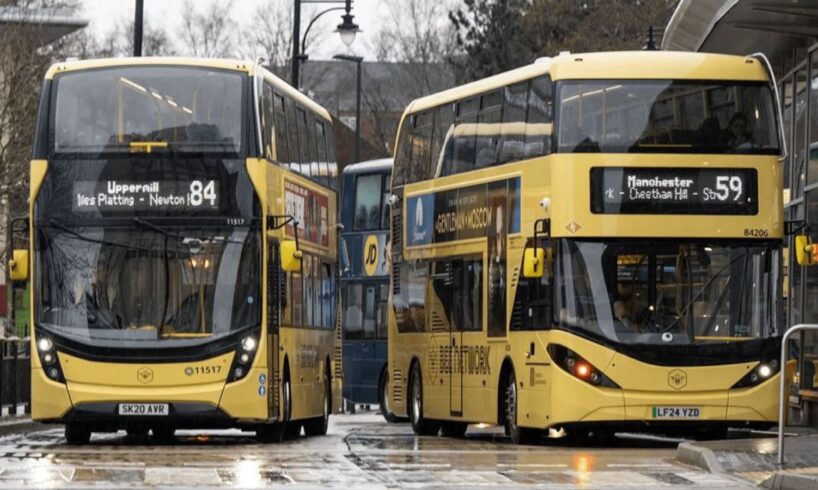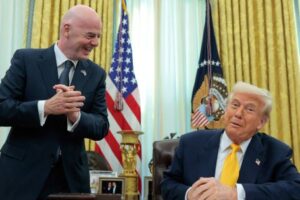
Bus drivers spoke to the World Socialist Web Site after the Unite union pushed through deals concocted behind closed doors in collusion with Labour Mayor Andy Burnham and three bus companies, at their operations in Greater Manchester, England.
The Stagecoach, Metroline and First Bus private companies operate as franchises under the “Bee Network”—coordinated by TfGM (Transport for Greater Manchester) under the control of the Greater Manchester Authority comprising 10 councils—headed by Burnham.
Bee Network buses operated by Stagecoach Manchester at Oldham bus station in April 2024 [Photo by Transport for Greater Manchester / CC BY 4.0]
Workers learned at the eleventh hour that Unite had suspended strike action planned for October 10, 11 and 13 by 2,000 drivers at Stagecoach and Metroline. They had no chance to scrutinise and discuss what was being offered.
Joint strike action by drivers at First Bus , Stagecoach and Metroline took place September 19-22. That was the only collective action. Unite then put what they described as “an exceptional pay deal” to 110 First Bus drivers, which was accepted after being sold as a 20 percent rise. This was from a low bar of £15 an hour, the lowest rate for drivers in the region. The drivers failed to achieve pay parity with those at other companies. Wages will rise to £17 an hour on weekdays, £18 on Saturdays and £19 on Sundays from January—staggered over six months, with a further £1 increase in April.
Before the scuppered strike plans at Metroline and Stagecoach, Unite had tried to foist a deal at Stagecoach that was rejected by drivers.
With little confidence in the union, drivers at Metroline and Stagecoach have accepted a revised offer with over 80 percent in favour. The “exceptional offer” championed by Unite consists of 5.9 percent backdated to April 2025 followed by a further 5.9 percent in 2026. None of the issues relating to conditions at work, including lack of toilet amenities, poor pensions and exhaustion, were addressed.
WSWS reporters spoke to drivers at Stagecoach’s Oldham depot and the Hyde road Metroline depot, distributing the article Unite ends Greater Manchester bus strikes on Labour mayor and private operators’ terms.
A driver at Oldham said, “I wanted a one-year deal… the rich get richer. When you’re on strike and losing money, you just take the deal.”
His colleague agreed, saying, “That deal could have been better, it shouldn’t have been over two years,” expressing concern that inflation would eat up the rise.
Another driver explained, “I think the union got most of the drivers to vote yes because of the backpay and Christmas coming,” he said. “The pay negotiations took so long, it started in April. Many of the drivers have to live beyond their means and are in debt.”
He continued, “Everyone thinks Andy Burnham is an angel. He’s far from it. Can it get any worse…if he’s going to be the next Prime Minister!”
Burnham has been identified as a possible candidate for Labour leader should Keir Starmer be removed. Burnham has directly intervened to clampdown against the strike action, appealing to “union representatives to work with us on that”, on the grounds that the region and companies “are not awash with money.”
At Metroline’s Hyde Road Depot, a driver condemned the “award over two years. That’s no good in relation to the cost of living… food prices and the cost of petrol are going up. People are finding they can’t live. You’re always behind.”
In relation to anti-immigrant xenophobia being whipped up by the Starmer government, in competition with the Tories and Reform Party, he said, “They cause conflicts to deflect [from the rising cost of living]. The main problem is the government. It’s gone downhill since the 2008 crash, and who’s going to fix it?
“Everyone in this country needs to stand up and walk out. We all need to go on strike. I’ve been thinking for the last year about all these things.”
Strikers outside the Metroline depot, Hyde Road, Manchester
The strike by bus drivers ended just as hundreds of other staff at TfGM embarked on a series of stoppages which started with a walk out on October 18 to be followed by rolling strike action 20, 23, 24 and 25 October. The members of Unite or Unison rejected an insulting 3.2 percent offer—a real-terms pay cut with RPI inflation standing at 4.6 percent. They work in ticketing, passenger assistance and information services for the bus and tram network. The timing of the ending of the bus strikes by Unite underscores how it works to undermine a unified struggle across the Bee Network.
Unite also suspended planned strikes by Stagecoach drivers at Birkenhead, Chorley and Preston, as well as at First Bus in Bristol, and Go Ahead in Brighton and Crawley to push through deals described as “wins” based on marginal improvements on the original derisory offers. This is to block a potential national strike development cutting across company divisions and maintains the framework of different pay rates and conditions across the UK for workers who do the same job and provide a vital public service.
The Bee Network is a form of privatisation supported and subsidised by state funding and has nothing in common with genuine public control of transport, which Burnham boasts it is. TfGM purchased new electric buses manufactured by private companies from central government funding. On behalf of the bus companies which are raking in profits, TfGM coordinates the bus routes and timetables.
Last year, Stagecoach reported profits of £51 million, while in the first half of 2025 Metroline gained £60 million from its European operations for parent company, ComfortDelGro.
Unite does not call for bus services to be taken out of the hands of the private profiteers and brought back under public ownership because this would entail a fight for workers control with no compensation to the parasitic corporate elite.
The union’s main concern as general secretary Sharon Graham insists, is to have a seat at the table of Greater Manchester’s franchising model as it is extended across England and Wales. Separate bus companies competing for contracts means a race to the bottom in terms of pay and conditions for workers.
The unions betrayed the struggle against privatisation of state industries and the anti-strike laws—introduced under the Margaret Thatcher’s Conservative government (1979-90) and continued and extended by all successive governments including Labour.
Bee Network workers should establish a rank-and-file committee across the companies independent of the Unite bureaucracy to unify their struggles—to continue the fight for better wages and conditions, linked to taking control and ownership of transport out of the hands of the profiteers.
We invite Stagecoach, Metroline and First Bus drivers and drivers at other companies to with any information, comments or feedback.
Make your voice heard! Tell us what your working conditions are like and what you are fighting for. We will protect your anonymity.





